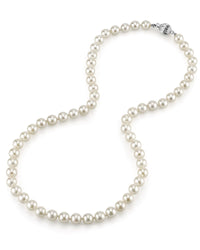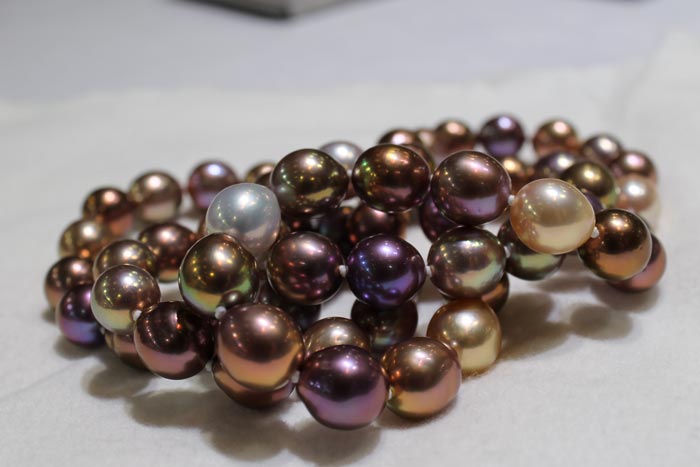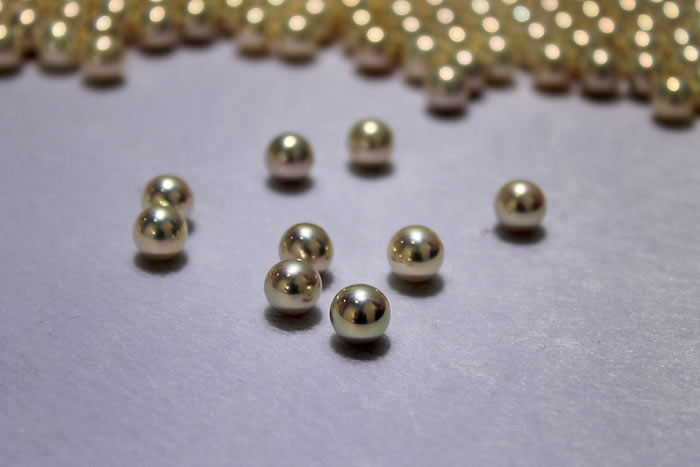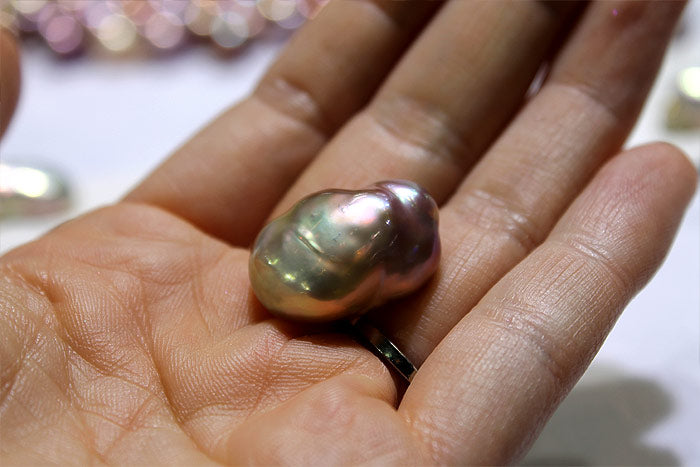In the previous sections, color wasn’t mentioned in order to focus on shapes. However, a most important part of ‘The Shape of Things to Come’ in the Pearl World, is color, so let’s make a brief backtrack. For many years the producers of Chinese freshwater pearls bleached all pearls white, or dyed them black for the standard customers, and dyed them every garish color in the book for the bead trade.
The pinks, peaches, and lavenders began being appreciated as the pearls got bigger, thus saving on processing and dying costs, no doubt. The darkest shades are still the most valued, but any shade was popular.
As people started noticing the pearls with partial metallic colors, China began sorting out freshwater pearls that had a peach or lavender body color, but were entirely metallic in luster. More rarely a white metallic necklace could be sorted out of the harvest.
It is these slightly off round, but metallic, pearls that became the avid collector’s prize pearls in the last 5 years. The white metallics outshine akoya whites; it is only the slightly off roundness that tells one these are not nucleated sea pearls. But they are the apex of the tissue- only nucleated pearls and the metallic colors are also the best and most rare solid nacre freshwater pearls ever produced, so far. For customers that like the natural look of the slightly off round pearls with solid nacre and no nucleus, this was the best so far. It would take major innovation by the Chinese to improve on the solid nacre metallic luster of the tissue-only graft.
After this masterful achievement, where could the pearl world go?
If there is a frontier left to conquer in the world of pearl farming, the customers say it’s, “SIZE”! Big pearls have never been easy to get, even in a cultured pearl. There are reasons there have not been a lot of really large freshwater pearls, so far. Without any nucleus the largest pearls tend to flatten, so big round pearls need a big round nuclei such as in the ripple and Edison pearls. Big nuclei are expensive and rare.
The difficulty of finding good material for nuclei has resulted in a lot of experiments over the years. The Chinese have pondered this subject and every once in a while it is possible to see the results of a different idea. One such case was the so-called soufflé pearls. They were said to have been nucleated with mud, which was washed out of the pearl before drilling, thus rendering the pearls empty and very lightweight. The pearls were all baroque, huge, and very colorful. The whites were alive with the play of secondary colors.
To find that answer out we must look at nucleation in sea pearls, Josh Humbert of Kamoka Tahitian pearls and Douglas McClaren of Sea of Cortez pearls are experimenting with a kind of sponge nucleus that goes into the oyster’s pearl pocket tiny and dry, then expands tremendously, forcing the oyster to cover a very large nucleus with nacre. This allows a very young oyster to produce a huge pearl when they still have the most colorful nacre. When used in a freshwater mussel, it should produce pearls like the Souffles, but without the messy mud.
This is far from the end of experiments to make bigger, rounder and more colorful pearls! The perfect nucleated giant pearl has already been achieved, but no doubt the Chinese will continue expanding the size of pearls a customer can buy while lowering the price. The perfect giant round ones will never be cheap, but lucky customers benefit from a large selection of shape, color and size in freshwater pearls, that is greater than ever before.
It remains to be seen if the Chinese will continue to produce the very round and gem quality metallic non-nucleated pearls when the nucleated ones have a much higher percent of roundness. I think there will be a big popular shift to nucleated pearls because the colors are so spectacular. And I think these pearls will be the new Chinese top of the line.
What I have seen so far is that the Chinese keep perfecting techniques, so I expect to be surprised with something new again in the near future.




